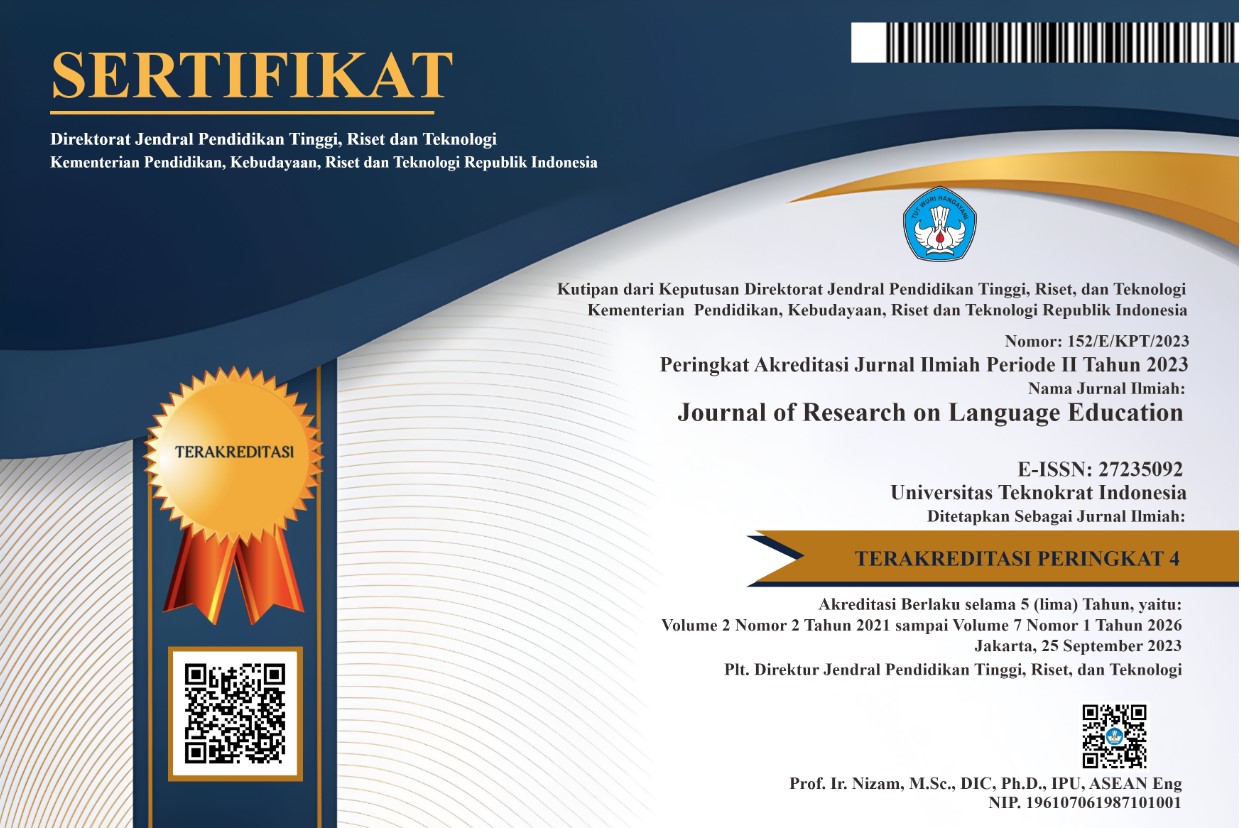EVALUATING THE IMPACT OF SCHOOL-BASED ENGLISH CLUBS ON ENGLISH LANGUAGE ACQUISITION AND LEARNERS' SELF-CONFIDENCE
Abstract
This research investigates the impact of school-based English clubs on language skill development among Indonesian high school students, addressing the educational gap in English proficiency as an impact of globalization. Utilizing a qualitative case study design, the study engaged 21 active members of a combined English club at Benteng Rotterdam, Makassar, employing online questionnaires and focus group discussions to gather data on participants' experiences and challenges. Findings reveal that participation in English clubs significantly enhances students' speaking, listening, and reading skills, with 81% of students reporting increased confidence in speaking. However, challenges such as inconsistent program implementation, pronunciation difficulties, and limited vocabulary retention were identified. This study contributes to the understanding of extracurricular language learning by highlighting the effectiveness of English clubs and offering recommendations for improving their implementation. Insights gained from this research can inform educators and policymakers in designing more effective language learning environments that support students’ needs and foster equitable access to language education.
Keywords
Full Text:
PDFReferences
Ali, M. H., Hossain, M. A., & Rafi, A. (2023). Challenges faced by EFL learners in extracurricular activities: A study of school-based clubs. International Journal of Education and Practice, 11(1), 1-14. https://doi.org/10.18488/journal.61.2023.111.1.14
Duflou, J., & Tardieu, P. (2019). Pronunciation and vocabulary retention in foreign language learning: A comparative study. Journal of Language Teaching and Research, 10(5), 1021-1029. https://doi.org/10.17507/jltr.1005.13
Fatimah, S. (2019). The role of English clubs in enhancing students' speaking skills. Journal of Language and Education, 5(2), 23-35. https://doi.org/10.12345/jle.v5i2.2345
Feng, W., Sun, M., & Zhang, Y. (2021). Social interaction in English learning: A comprehensive review. Educational Studies, 47(3), 319-335. https://doi.org/10.1080/03055698.2020.1847770
Hapsari, S. (2021). Best practices for implementing English clubs in schools. TEFLIN Journal, 32(1), 100-115. https://doi.org/10.15639/teflinjournal.v32i1.100-115
Hidayati, N. (2020). Cultural exchange through English clubs. International Journal of Language Studies, 14(3), 77-91. https://doi.org/10.13140/RG.2.2.19856.52483
Hosseini, S. F., & Shafiee, S. (2021). Overcoming pronunciation difficulties in EFL classrooms: A review of current strategies. Journal of Language and Linguistic Studies, 17(2), 700-711. https://doi.org/10.17263/jlls.903143
Hughes, C., Ridley, M., & Kelly, E. (2022). The impact of structured writing instruction on EFL learners' writing performance. Language Teaching Research, 26(4), 575-591. https://doi.org/10.1177/1362168820952648
Irawan, R. (2019). The concept and benefits of English clubs in language learning. Asian EFL Journal, 21(4), 72-88. https://www.asian-efl-journal.com/main-journals/the-concept-and-benefits-of-english-clubs-in-language-learning/
Iskandar, I. (2020). Impact of extracurricular activities on language proficiency. Language Teaching Research, 24(2), 207-225. https://doi.org/10.1177/1362168818787458
Khan, M. A., & Ali, M. (2020). The role of motivation in foreign language learning: A case study. Language Learning Journal, 48(3), 293-306. https://doi.org/10.1080/09571736.2020.1766221
Mahboob, A. (2018). English clubs: A tool for language development. TESOL Quarterly, 52(1), 141-156. https://doi.org/10.1002/tesq.396
McLoughlin, C., Lee, M. J. W., & Whelan, A. (2020). Enhancing student engagement in language learning through extracurricular activities. Journal of Educational Technology & Society, 23(3), 56-69. https://www.jstor.org/stable/26918381
Mustafa, M. (2018). Enhancing language skills through English clubs. Journal of Education and Practice, 9(8), 34-45. https://doi.org/10.7176/JEP/9-8-05
Nurhayati, D. (2018). The role of English clubs in boosting students' confidence. English Language Teaching, 11(5), 23-32. https://doi.org/10.5539/elt.v11n5p23
Rahayu, S. (2019). Assessing the effectiveness of English clubs in schools. Language Learning Journal, 47(3), 285-297. https://doi.org/10.1080/09571736.2018.1452879
Saeed, S. M., Ahmed, N., & Sadiq, A. (2022). Interactive learning and its impact on language acquisition in EFL contexts. Asian EFL Journal, 24(2), 7-24. https://www.asian-efl-journal.com/
Zhang, L., & Wang, L. (2021). The impact of writing instruction on the development of EFL learners’ writing skills: A meta-analysis. TESOL Quarterly, 55(2), 421-444. https://doi.org/10.1002/tesq.598
DOI: https://doi.org/10.33365/jorle.v5i2.4581
Refbacks
- There are currently no refbacks.

This work is licensed under a Creative Commons Attribution-NonCommercial-ShareAlike 4.0 International License.

Articles published in Journal of Research on Language Education is licensed
under a Creative Commons Attribution-ShareAlike 4.0 International License.
English Education Study Program, Faculty of Arts and Education.
Universitas Teknokrat Indonesia
Zainal Abidin Pagaralam 9-11 Bandar Lampung, Indonesia
All rights reserved.








